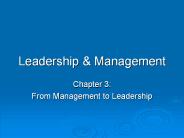Leadership - PowerPoint PPT Presentation
1 / 13
Title:
Leadership
Description:
In terms of the power relationship between leaders & followers ... Jim Jones. David Koresh. Coercion Involves. Examples of Coercive Leaders. Power & restraint used ... – PowerPoint PPT presentation
Number of Views:26
Avg rating:3.0/5.0
Title: Leadership
1
Leadership
Leadership Theory and Practice, 3/e Peter G.
Northouse, Ph.D.
2
Overview
- Conceptualizing Leadership
- Leadership Definition
- Components of the Definition
- Followers Leadership
3
Conceptualizing Leadership
Some definitions view leadership as
- The focus of group processes
- A personality perspective
- An act or behavior
- In terms of the power relationship between
leaders followers - An instrument of goal achievement
4
Leadership Defined
- Leadership
- is a process whereby an individual influences a
group of individuals to achieve a common goal.
5
Components Central to the Phenomenon of
Leadership
Leadership
- Is a process
- Involves influence
- Occurs within a group context
- Involves goal attainment
Leaders
- Are not above followers
- Are not better than followers
- Rather, an interactive relationship with
followers
6
LEADERSHIPDESCRIBED
- Trait vs. Process Leadership
- Assigned vs. Emergent Leadership
- Leadership Power
- Leadership Coercion
- Leadership Management
7
Trait vs. Process Leadership
Trait definition of leadership
- Certain individuals have special innate or inborn
characteristics or qualities that differentiate
them from nonleaders. - Resides in select people
- Restricted to those with inborn talent
8
Trait vs. Process Leadership
The process definition of Leadership
- Leadership is a property or set of properties
possessed in varying degrees by different people
(Jago, 1982). - Observed in leadership behaviors
- Can be learned
9
Assigned vs. Emergent Leadership
Assigned
Emergent
- Leadership based on occupying a position within
an organization - Team leaders
- Plant managers
- Department heads
- Directors
- An individual perceived by others as the most
influential member of a group or organization
regardless of the individuals title - Emerges over time through communication
- Personality
10
Leadership Power
Bases of Social Power French Raven (1959)
Power
- Power is the capacity or potential to influence
- Two kinds of power
- Position
- Personal
- Reward
- Coercive
- Legitimate
- Referent
- Expert
Power is a relational concern for both leaders
and followers.
11
Leadership Coercion
Coercion Involves
Examples of Coercive Leaders
- The use of force to effect change
- Influencing others to do something via
manipulation of rewards and penalties in the work
environment - Use of threats, punishments, negative rewards
- Adolf Hitler
- Jim Jones
- David Koresh
Power restraint used to force followers
to engage in extreme behavior
12
Leadership Management Kotter (1990)
Management Activities
Leadership Activities
Produces order and consistency
Produces change and movement
- Planning / Budgeting
- Organizing / Staffing
- Controlling / Problem
- Solving
- Establishing direction
- Aligning people
- Motivating / Inspiring
Major activities of management and leadership are
played out differently BUT both are
essential for an organization to prosper.
13
Leadership ManagementZaleznik (1977)
Managers Unidirectional Authority
Leaders Multidirectional Influence































